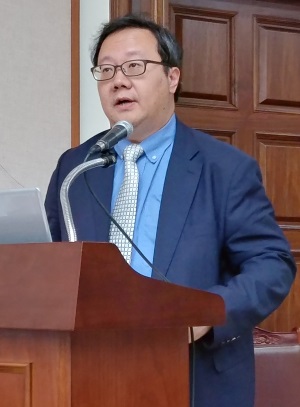An expert said expanding risk-sharing agreements (RSA) and introducing a post-evaluation system for new drugs can overcome the limitation of the economic feasibility tests.
RSA refers to an agreement between a pharmaceutical company and the National Health Insurance Service (NHIS) to share the responsibility for uncertainties regarding the drug’s efficacy.

On Tuesday, Rep. Lee Myoung-soo, chair of the National Assembly’s Health and Welfare Committee, the National Assembly Research Service, and the Korean Research-based Pharma Industry Association (KRPIA) held a seminar on improving economic feasibility tests on drugs for better patient access and vitalizing the pharmaceutical industry.
Ahn Jeong-hoon, a professor at the Department of Health Convergence at Ewha Womans University, said limitations of the economic feasibility review system could be complemented by an expansion of the RSA system and a post-evaluation system.
Ahn said the RSA system allows local patients to get access to new drugs without the risk of a multinational pharmaceutical firm excluding Korea in the drug supply. It also hedges a pharmaceutical company’s risk of setting a low drug price in a third country which references the drug price in Korea, he said.
By using the post evaluation system, the government can also secure financial stability by recollecting funds unnecessarily spent, he added.
“Global pharmaceutical firms under new drug development are providing medicines not only for Korea but various countries, and they recently started to reference drug prices in Korea in many other countries. So, multinationals are avoiding to enter the Korean market because new drugs could be priced low,” Ahn said.
He took an example of Saudi Arabia, which revised its drug pricing program in 2016 and officially announced that it would reference drug prices in Korea. Drug prices in Saudi Arabia affect most nations in Northern Africa, he said.
Ahn pointed out the limitation of the RSA, by citing immunotherapies.
When the government introduced the RSA system for immunotherapies, which are now actively used, no one could prepare for hyper progression issue, he noted.
“As patients began to use immunotherapies more, early deaths during the medication occurred, and experts raised a need for research on the issue. There is great uncertainty over whether the RSA system can apply to immunotherapies,” Ahn said.
The government’s proposal to introduce a post-evaluation system could be one solution, he said, adding that it would matter how the government can evaluate the legitimacy of the data for the post evaluation.
In other words, the government should come up with an idea how to narrow the gap between the clinical trial data that a drugmaker submits for drug approval and the actual outcome of the drug’s efficacy in patients who took them.
Ahn questioned the government’s current standards for the economic feasibility review on drugs such as appropriateness of standards, fairness, and expertise of reviewers.
“Unlike Korea, other countries rarely depend on an economic feasibility review when measuring a new drug’s value. While Australia and the U.K. assess it by the shipment price when the cost-effectiveness is proved, Korea evaluates it by including distribution and sales margins. So, the drug’s value is cut already starting from here,” said Cho Yeong-mi, head of market access at Sanofi-aventis Korea, in a panelist debate.
She noted that the quality-adjusted life year (QALY) was undervalued in Korea. She also urged the government to improve the rigidness in the assessment and decision making of the Health Insurance Review and Assessment Service (HIRA).

